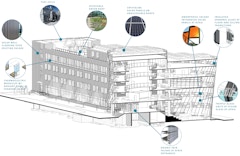
Thermal Bridging and Building Facades
Thermal bridging through building façades have been overlooked by designers and building energy codes and standards in the past, which has led to…



...the design and construction industries are notoriously resistant to change, putting them on a collision course with the many cities, states, and provinces that are moving ahead of national standards in keeping with declared intentions to dramatically cut their carbon emissions this decade.




This paper analyzes sustainable retrofit strategies for an existing research laboratory building, located in a cold climate. This facility is







The real estate market continues to demand “all glass” buildings often to the detriment of human comfort and thermal performance. For an office

Kinetic or responsive facades have been developed to improve buildings' daylighting conditions while mitigating energy consumption. Still, these



